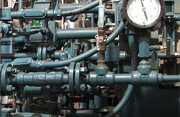Cogeneration of electricity and heat is one of the most promising means of using existing technologies for sustainable ends, but it is also one of the most neglected and least understood. Cogeneration can dramatically increase energy efficiency, slash carbon emissions, and save money.
Using cogeneration in combination with heat-pump technology and plug-in vehicles as part of a renewable electric grid, we could say goodbye to gasoline and to coal electricity generation and have a real chance in 10 to 20 years for an 80 percent reduction in carbon dioxide emissions. This transition will not require rocket science but simply the integration of existing technologies.
Turning Toward Cogeneration and Plug-in Vehicles
Four-dollar-per-gallon gasoline has already been sufficient for General Motors to stake its future on the plug-in Chevy Volt and the Saturn Vue while putting the Hummer brand up for sale.
Home heating oil is also approaching $5.00 per gallon. When one purchases a new boiler, the combustion efficiency can be about 90 percent and it seems that not much more can be done. But the overall efficiency, in terms of the potential for useful work when burning fossil fuels for space heating, based on the laws of thermodynamics, is around 4 percent.
At a time of soaring energy costs, cogeneration is one way to ease the pain. It should capture our attention that the value of the "waste" heat dumped into the air or water by power plants can be worth about twice as much as the electricity that's generated and sold.
Cogeneration is already operating and has for decades in city-sized district heating and cooling systems. There is a venerable steam system in Manhattan, run by ConEd, and another in Concord, New Hampshire, where electricity and heating for the city center is provided by wood chip–fired boilers run by Concord Steam.
The city of St. Paul, Minnesota, operates the largest hot water district heating system. Installed in 1983, the system uses a wood waste–fired power plant and now also provides district cooling through stored chilled water produced by low-cost nighttime electric power.
Thermodynamics is on Cogeneration's Side
The secret behind cogeneration rests upon the first two laws of thermodynamics. First, energy is neither created nor destroyed, it merely changes form. Second, as energy is used there is a movement from order to disorder, from higher quality to lower quality—an increase in entropy.
The second law is why systems don't run backwards without the addition of more energy. The total energy from a boiler—the heat sent into the house and the heat that flows up the smokestack—is equal to the total energy released from the fuel. That's the first law. The total is the same. We can use the heat to warm hot water, but we can't use that low-temperature heat to once again produce the fuel. What we have is energy reduced in quality and ability to do useful work. Cogeneration allows us to produce high-quality electricity before the fuel is degraded to low-temperature heat.
At Southern New Hampshire University, we're working on a wood gasifier using sawdust to run gas engines that will generate an estimated 2 million kWh of electricity as well as heat the east side of campus. This system will provide power for a ground-source heat pump system, based on shallow wells near the Merrimack River which are under development.
Heat pumps, essentially a reversible air conditioner, are designed to put heat into or take heat out of air or water. Heat pumps take advantage of another thermodynamic principle, the Carnot cycle, to provide several times higher entropy space heating or cooling energy out than lower entropy electricity in by taking advantage of the heat of evaporation and condensation. With commercially available water- and air-source heat pumps we can get a Coefficient of Performance (C.O.P.) of 3.0–4.0 or higher, meaning three to four times as much heating or cooling BTUs out as electric BTUs in. A C.O.P. of 25 is theoretically possible, giving us room for improvement.
An Energy Budget to Save Dollars and Carbon
To heat our home today we burn a therm of natural gas (100,000 BTUs), and get 85,000 BTUs for space heating. At current prices, this costs about $1.75. We're also paying $.17 per kWh for electricity, and we still have to heat hot water with natural gas at 20,000 BTUs per hour or $.35. And we're paying about $4.50/gallon for gasoline.
Under business as usual, with our boiler, separate hot-water heater, and gas-guzzling car, it costs us $4.29 per hour on a cold winter day to keep our house warm, take a hot shower, and allow one family member to drive back and forth the dozen or so miles to the mall.
Using a basement cogen system, combined with a heat pump and a plug-in vehicle, it costs us $1.75 an hour to do the same thing—the cost of one therm of natural gas. We save $2.54 an hour. If the system runs 2,500 hours per year full-time equivalent, that's a yearly savings of $7,325 to heat our house and hot water and drive our cars 33,000 miles.
Carbon savings from a cogen system are similarly impressive when compared to business as usual. Burning one therm of natural gas per hour in our cogen system releases about 12.1 lbs. of carbon dioxide. Compare that with 10.1 lbs. of carbon dioxide from burning .53 gallons of gas (at 25 mpg), and 15.9 lbs. of carbon dioxide for heat and hot water, for a total of 26.0 lbs.
Thus the cogen, heat pump, plug-in vehicle system saves 13.9 lbs. of carbon dioxide per hour, for a net reduction of 53 percent. If a cogen system is fueled with renewable energy plus fuel cells, the 80 percent emissions reduction target comes within reach.
This is the direction we should be moving with all deliberate speed.
![]() This article is licensed under a Creative Commons License.
This article is licensed under a Creative Commons License.
Please read our usage policy.





